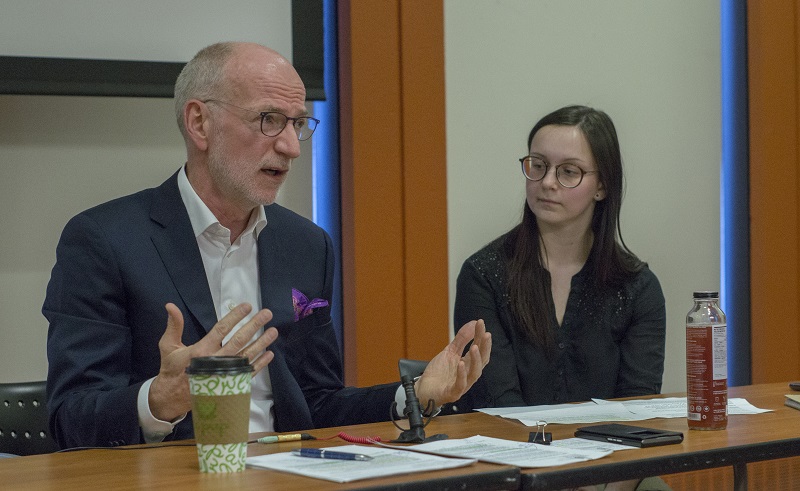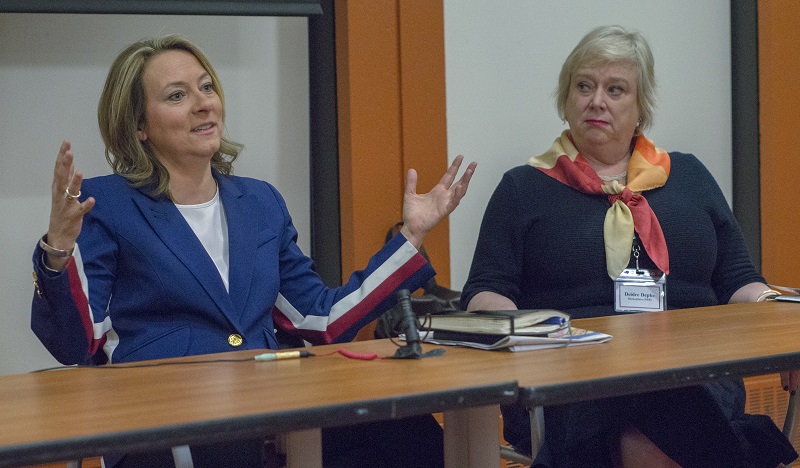McGill hosts discussions with industry bigwigs, veteran correspondents and student journalists
Even though journalism is facing enormous challenges, the profession is going through somewhat of a renaissance. That was the general consensus among panelists at the Journalism and Media Conference, held in the McGill University Student Centre from Feb. 26 to 28.
The conference was co-hosted by The Tribune and The Daily publishing societies, responsible for publishing McGill’s two English-language student newspapers. The panels featured conversations with new and veteran industry insiders, moderated by editors from The Tribune, The Daily and McGill’s francophone student newspaper, Le Délit.
The editor-in-chief of the McGill Tribune, Nicholas Jasinski, said the goal of the conference was to provide McGill students interested in journalism with the opportunity to learn about the industry and its future. “Unlike Concordia, McGill does not have a journalism program, and part of the [Tribune] Publishing Society’s mandate is to act as an educational resource for students interested in journalism,” he said. Each panel related to the conference’s theme, “journalism redefined,” and focused on recent trends in the industry that have changed the way journalists do their job.
Day One: Public Broadcasting
Panels on the first day included some serious CBC heavyweights, such as Julian Sher, a senior producer at CBC’s The Fifth Estate, who led a panel on investigative reporting.
There was also a bilingual Q&A session with Hubert Lacroix, the former president and CEO of CBC/Radio-Canada. Lacroix was blunt when he compared the CBC’s funding model to other public broadcasters around the world. “I’ll tell you that we have a different business model, and I’ll tell you right away that it’s broken,” he said.
Lacroix explained that 65 per cent of the CBC’s revenue comes from the government, and 45 per cent comes from commercial revenue, notably television advertising. Due to the overall decrease in advertising revenue in the media industry, Lacroix was adamant that the CBC needs to be completely government-funded to ensure its future success.
“We want to go ad-free in order to have stable, multi-year funding,” he said. “You need to be able to give us a funding model that is not crumbling.”
The next panel featured long-time senior correspondent and the new co-host of CBC’s The National, Adrienne Arsenault. She was joined by Deidre Depke, the New York bureau chief for NPR’s Marketplace. Both women agreed that President Donald Trump’s animosity towards the press, and the recent increase in newspaper subscriptions seemingly in response to his attacks, have created an exciting news environment to work in. “This is an era of ‘bring it,’” Arsenault said. “This is what separates the posers from the people who really do the job.”

Day Two: Fake News and Foreign Correspondence
Day two began with Emily Kingsland, a research librarian at McGill, leading a workshop on verifying news to avoid being duped by websites masquerading as legitimate news sources.
Kingsland recommended techniques such as considering the audience an article is written for, assessing the authority or credibility of the source, and keeping an eye out for sloppiness, like typos or unprofessional tone and word choice.
Then, for a different look at fake news, Emma Overton from The Beaverton, a Canadian news satire website, answered questions about what it’s like to write made-up news for a living.
Overton talked about The Beaverton’s writing process, but also provided an eloquent explanation of the difference between fake news and satire, arguing that good satire is actually rooted in truth. “Its intent should be to expose and criticize a societal ill and make people more curious about the topic,” she said. “The intention of fake news is almost always to deceive the reader for political gain.”
In the evening, two highly-accomplished foreign correspondents, Dan Bilefsky from The New York Times and Michel Cormier from Radio-Canada, shared anecdotes about the specific highs and lows they’ve experienced as foreign correspondents. The Montreal-born Bilefsky was recently re-assigned to Montreal by The New York Times as a “Canada correspondent,” part of the paper’s push to appeal more to their Canadian readers. He spoke about the peculiarity of returning to his hometown after 28 years, and going from writing about war criminals to writing about poutine.
Day Three: Indigenous Reporting
The most compelling panel of day three was on Indigenous reporting. It featured Daniel Rowe, a reporter for The Eastern Door, Kahnawake’s community newspaper, and Christine Lussier, the co-producer of Nipivut Radio, an Inuit community program on McGill’s radio station, CKUT.
Lussier pointed out that many distinct nations and communities fall under the umbrella of “Indigenous” in Canada, and there is a common misconception that all Indigenous reporting focuses on the same broad issues. In reality, Lussier said, an Indigenous reporter’s writing will reflect the community they are reporting on, as with any other reporting.
The two panelists also discussed the role Indigenous reporting plays in creating a more diverse representation of Indigenous people in the media, rather than the handful of cliché news stories that tend to be written about Indigenous communities by non-Indigenous reporters.
Feature image by Kenneth Gibson




